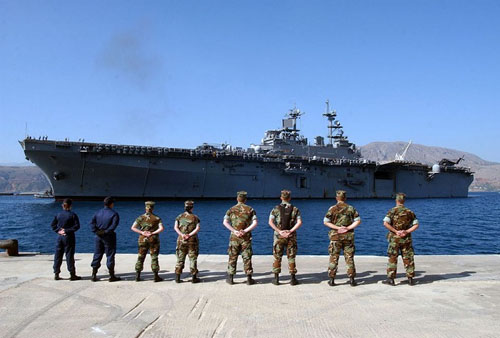by WorldTribune Staff, February 10, 2020
As NATO member Turkey grows increasingly authoritarian — and moves closer to Russia — its long-time rival and fellow NATO member Greece is bolstering its Mediterranean presence and role in the Western alliance. Part of that increased presence involves joint naval maneuvers with France and strengthening its strategic partnership with the United States.

Greece’s historically-strained relations with Turkey have deteriorated further in recent months under the added burden of migration and an energy exploration scramble in the eastern Mediterranean. And after a decade-long debt crisis that saw Greek arms spending drop by over 70 percent, the Mitsotakis government wants to be heard, says Spyridon Litsas, a professor at the University of Macedonia in an AFP report.
According to a report by JINSA, a U.S. think tank, “Athens appears to be filling the void left by Turkey’s gradual estrangement from America and the West. Greece aspires to take over Ankara’s role as the southeastern bastion of the Western alliance, and to become a diplomatic and economic hub interlinking Europe and other growing regional players like Israel, Cyprus and Egypt.”
In January, Greece’s U.S.-educated Prime Minister Kyriakos Mitsotakis revamped a defense agreement with the U.S. “We are strengthening the framework of our strategic alliances, not just with the U.S. … our military cooperation (with France) has never been better,” he told lawmakers in January. As reported by Ekathemerini.com, this was quickly followed by a multinational Greek-U.S.-French exercise, called “Alexander the Great 2020”, which included the French aircraft-carrier “Dixmude” and simulated recapturing a Greek island from enemy forces.
Greece’s growing relationship with France, which is attempting to develop its own independent role in the Mediterranean, is particularly noteworthy. Earlier, according to AFP, a Greek warship had joined the French aircraft carrier Charles de Gaulle, whose battle group is on a mission against Islamic State (ISIS) in Iraq and Syria.
AFP also reported that diplomats say France has encouraged Greece to be more “autonomous” and play a more active role in EU defense initiatives. Right now, “France is the ideal Greek ally,” Panagiotis Tsakonas, a professor of international law at Athens University. “The two countries share views on the situation in the eastern Mediterranean,” he said, citing involvement of French firms in energy exploration off Cyprus, historically Greece’s chief ally.
U.S. analysts meanwhile suggest increasing U.S.-Greek defense ties even further. As Eric Edelman and Charles Wald wrote in the National Interest, “Athens is becoming a crucial pro-American player at the center of important security issues in the Eastern Mediterranean. The United States must take advantage of this budding relationship, as part of a renewed strategic focus on the region.”
In that vein, the JINSA report, “U.S. & Greece: Cementing a Closer Strategic Partnership”, proposes increasing bilateral military-to-military ties, including providing meaningful amounts of foreign military financing (FMF) for Greece to purchase U.S. weapons and equipment.
It also recommends the United States explore options to bolster its forward military presence in Greece with increased rotational deployments through various installations and larger presences of forward-based troops at Greek bases. The United States should additionally view Greece, and potentially Cyprus, as viable, and reliable, options for relocating U.S. military assets currently deployed in Turkey.
However, military cooperation should not be the only approach. Economics and politics need to play a key role in expanded U.S.-Greek ties, as Turkey has pushed ahead, despite threats from the EU, with drilling activity in Cyprus’s designated exclusive economic zone (EEZ). According to AFP, Turkey has also “signed a maritime and military cooperation memorandum with the Tripoli-based Government of National Accord (GNA) in November, carving out energy spheres of influence in the Mediterranean at the expense of Greece.”
Constantinos Filis, executive director of the Athens-based Institute of International Relations, agrees that Athens “must demonstrate its presence and secure backing in the face of Turkish claims in the region.”
As part of U.S. efforts to bolster ties with Greece, JINSA also recommends the United States go beyond rhetorical support for Greece’s and Cyprus’ trilateral diplomatic engagement with Israel and Egypt. “France and Italy are sending tangible signals of support for their countries’ energy companies that are operating amid Turkish interference and intimidation offshore Cyprus. American policymakers must now seriously consider similarly concrete backing.”
Intelligence Brief __________ Replace The Media
